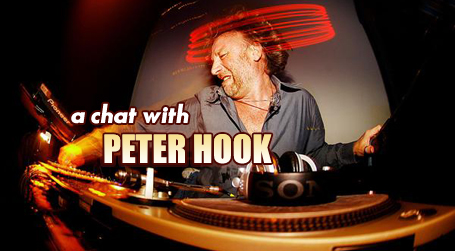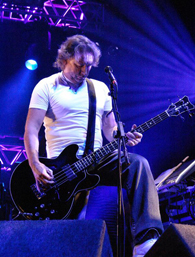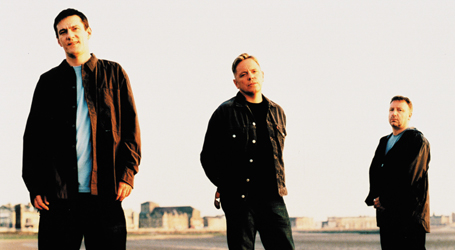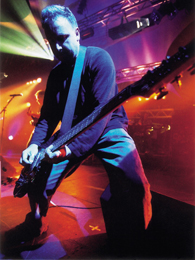 With the temperature dropping, it's time to find someone to keep you warm. Find your hookups with our online dating guide!
With the temperature dropping, it's time to find someone to keep you warm. Find your hookups with our online dating guide!

Interview date: 06/26/2008
Run date: 07/10/2008
Music Home / Entertainment Channel / Bullz-Eye Home
There aren’t many bass players out there who can say that they’re directly responsible for aiding in a band’s signature sound, but there’s little question that Peter Hook can count himself among their number. Hook served as bassist for Joy Division and, after the suicide of frontman Ian Curtis, transitioned into the band’s new incarnation as New Order, where he thrummed along in good stead until 2007. We spoke with Hooky – that’s what they call him, you know – in conjunction with the release of the New Order: Live in Glasgow DVD, and we asked about his time in these two highly influential groups and why he’s chosen to depart from New Order’s ranks after all these years. We also found time to geek out and quiz him a bit about Revenge, Monaco and his latest endeavor, Freebass, as well as his thoughts on how Joy Division’s music is suddenly being re-discovered almost 30 years after it was originally released.
Peter Hook: Hello, Will!
Bullz-Eye: Hello, Peter! How are you?
PH: I’m all right, thank you very much.
BE: It’s a pleasure to speak with you.
PH: Mmmm. Well, I hope so. We’ll decide afterwards, shall we?
BE: (laughs) I’m keeping my fingers crossed. I must say that I’m very pleased that you decided to do a round of press to promote this DVD.
PH: Well, even in the current climate with what happened to New Order, Steve and I worked very hard on the DVD, so, y’know, I am proud of what we accomplished, so it’s not that difficult to talk about it.
BE: Yeah, I was going to ask how much input you had in it. Did you and Stephen just sit down and go through hours of tapes?
 PH: Stephen and I were both very upset with the last (live DVD), which was Live at Finsbury Park. The editing of it looked like it was trying to appeal to a hyperactive 5-year-old, and I fucking hate that. When I watch music and you get those fast cuts, I just think it ruins everything. So Steve and I were adamant that we didn’t want that to happen with this, and so we went through the whole process of each song, chopping the edits out, so you could make some that was more “Old Grey Whistle Test,” if you like, than Channel 4. I don’t know what else to compare it to in America. You sound English. Are you English?
PH: Stephen and I were both very upset with the last (live DVD), which was Live at Finsbury Park. The editing of it looked like it was trying to appeal to a hyperactive 5-year-old, and I fucking hate that. When I watch music and you get those fast cuts, I just think it ruins everything. So Steve and I were adamant that we didn’t want that to happen with this, and so we went through the whole process of each song, chopping the edits out, so you could make some that was more “Old Grey Whistle Test,” if you like, than Channel 4. I don’t know what else to compare it to in America. You sound English. Are you English?
BE: (laughs) I’m not. But I’ve read enough issues of “NME,” “Q,” and “Mojo” to appreciate the references.
PH: Well, good.
BE: Did you feel old watching some of those old performances from the ‘80s?
PH: No, I didn’t, actually. It’s a great catalog, and the interesting thing about being in a group is that you can see every dodgy haircut you’ve ever had. And you look at yourself and you go, “Oh, you’re so thin!” But, no, I don’t feel old. It never strikes me like that. There are occasions when, obviously, I can’t do what I used to do. I suffer greatly with my back now from playing the guitar.
BE: Yeah, I saw on your MySpace blog that you had to have an MRI recently.
PH: Yes, but I’ve not got the results yet. The guy keeps phoning me. I must phone him. Fucking A, you’ve reminded me: I must phone my chiropractor.
BE: Based on the interviews within the DVD, you clearly prefer to play live versus being in the studio.
PH: Yes. I always have done. I’ve never changed. I’ve always viewed the live performance of a song as being the one that makes it. That’s the performance that matters. It’s funny, because Bernard and I always disagreed about fucking everything, and he always felt that it was the recorded one that was more important. But I suppose that’s what makes life interesting.
BE: There’s also a discussion on the DVD about how some songs just don’t translate to the live setting.
PH: Yeah, and it’s usually the ones you think will. We noticed that when we came to play a lot of Technique, for some reason it didn’t translate, which was quite odd and very unexpected.
BE: Have there been any particular songs which really disappointed you to not be able to play live?
PH: Well, there was, like, “Run.” Things like that. It was odd. Usually, the sequenced ones were, because you had such a backbone, the easiest. But I think generally the rule is that, as you become more professional or older as a musician, you take less chances. It’s quite an odd thing. When you’re younger and cocksure, you basically do whatever you like and hang the consequences, and as you get older, you tend to fear the consequences. So I think that was probably the reason why, as you got older, you got more selective. But there were many songs that we never really tried to play live.
BE: Was there a specific moment when New Order collectively decided that it was okay to work a few Joy Division songs into their sets?
PH: I think it was…this is my memory of it, but we were doing a gig in New York for Ruth Paulson, and it was a charity concert, and it was her birthday, and she asked us to play her favorite song, which was “Love Will Tear Us Apart.” And we did. And then we started wheeling it out for special days…someone’s birthday or whatever…or if it was a big gig. Or if we were just bored, we’d play it. And then we just got into gradual acceptance of how great the songs were. I mean, it was funny, because it was only when I saw “24 Hour Party People” when I heard “She’s Lost Control” and I realized what a fucking great tune “She’s Lost Control” was. And I thought, “Maybe we should play that! Fuck, we should play that now!” So we started playing that. And it was a very gradual thing. I mean, I was really happy when we started playing a lot of Joy Division material, like we did for the cancer benefit in Manchester, when we did a whole Joy Division set. I thought it was fantastic, but Bernard thought it was very depressing. So it’s interesting. It’s nice to be able to have the freedom to do it, because they are such fantastic songs, and it was a wonderful group, and it’s a completely different atmosphere when you play them than when you play New Order stuff. New Order stuff is poppier and lighter, and Joy Division stuff is very serious and intense. And it was interesting to have both.
BE: Do you think that intensity is why Joy Division wasn’t really accepted by the mainstream as readily as New Order?
PH: Well, I don’t know, really. It was only a short period of Joy Division being anywhere near the mainstream, really, so it’s difficult to judge. I mean, you only had two singles – “Transmission” and “Love Will Tear Us Apart” – so there’s not a great deal of content to judge it. Of course, you’d have to say that most of Joy Division’s material is albums, so you’d be basing it on album tracks rather than singles.
BE: When the movie “Control” was being made, did you go out drinking with Joe Anderson so that he could get a feel for what it’s like to be Peter Hook?
PH: No, I’ve never met the guy. Never met him. It was quite funny, because when we did the screening, I went for a piss because the film was so long, and when I was pissing, I looked ‘round and Ian from the film (Sam Riley) and Bernard (James Anthony Pearson) from the film were weeing at the same time. And I said to them, “Oh, where’s the guy who plays me?” And they said, “Oh, he’s in Hollywood.” So I said to the guy who played Bernard, “There you go: you should’ve played me. Then you’d be in fucking Hollywood!” (laughs)
BE: Now, what did you think of the movie as a whole?
PH: I enjoyed it. I mean, I think the thing is that you have to be realistic and bear in mind that everyone’s memories are different and nothing’s the same. Everyone has a different memory from everyone else. This was very much Anton (Corbijn’s) thing, and Anton created a lot of the atmosphere, but on the whole, it was a lot more truthful than “24 Hour Party People.” Definitely. I mean, it was maybe 85 percent “Control” versus 60 percent “24 Hour Party People.”
BE: Have you seen the documentary, “Joy Division,” as well?
PH: Yes, I’ve seen it many times. (Producer) Tom Atencio is a great friend of mine, so I’ve been involved very much and have been charting its progress. I mean, I honestly thought when he started doing it that it was complete overkill, but it’s turned out so well and the revelation for me is the fact that…to hear the way Bernard and Stephen talk about Joy Division the way that they do is a complete revelation, because I’ve never really talked to them about it. Ever. And that is so weird, when you think about it. So I’ve actually learned a lot. It’s been quite cathartic for me, really. It’s very sad. I always get very moved when I watch “Control” or when I see the documentary. I mean, when you hear “Atmosphere,” if you’re not moved, you’ve got a stone heart. It’s funny, because Robbie Williams has got “Angels” for weddings, and Joy Division’s got “Atmosphere” for funerals. Unfortunate, that, really. It still does affect me. We glossed over it at the time and just ploughed on with getting on with our lives, and we didn’t really give it the gravity it deserved, but now it’s amazing, 30 years later, that it does still affect me.

BE: One of my fellow editors saw you guys play at Great Woods, in Boston, and he says that he knows that you probably don’t remember specific gigs, but you might remember this one. The band started playing “Blue Monday,” Bernard stormed off the stage early on, and when the lights came back up, you could still be heard playing your bass.
PH: (cackles) I do remember that. That was the tour when he was a right miserable cunt. That was the one when…it was our biggest tour, actually, which is what was ironic about it. We were playing to the biggest crowds we’d ever played. He was lucky, because I remember when we did a gig in Detroit, at some huge amphitheater, and he sat on the drum riser for the whole gig. He was a miserable bastard on that tour…and nothing changes, I’ll tell ya, man.
BE: Which New Order album do you think is the most underrated?
PH: Underrated? That’s difficult, that, because…it was funny, because I got the greatest joy listening to the re-masters. Whenever someone starts doing re-masters, there’s always this feeling that someone’s profiteering, and yet to listen to them, I thought they sounded wonderful, and I was very impressed, actually, with what a great album Low-Life was. And Brotherhood. I’ve not heard the re-masters of Movement yet. But it was really nice to hear the others. And because a lot of the singles weren’t on the albums, a lot of the B-sides were great tracks. It’s nice to hear that collection is going to be with the album of each specific period. So I’ve been very, very happy listening to it all, to be honest, and I was very pleasantly surprised with how good they are.
BE: Speaking of B-sides, when you look at the track listing for the second disc of the DVD, I’m just wondering how many of those haven’t been played in your set for the better part of two decades…or more!
PH: All of them, I think! Yeah, I mean, some of them are very old. It’s interesting to watch your music evolve, because when you listen to the older stuff, there’s a hell of a lot of music there. Long intros, long outros…you know, it’s not all vocals. I think part of my disenchantment with New Order toward the end was that it became very vocal-heavy, which was something we hadn’t done before; it had always been a very good mix of instrumental and vocal, and that was one of the differences in style.
BE: Well, I guess I’ll go ahead and ask the question about your status within New Order. So you’re officially done, then?
PH: As far as I’m concerned, we have officially split.
BE: Is that how they’re feeling, or are they still planning to go forward?
PH: Well, they’re entitled to do whatever they fucking want. I can’t make them do what I want them to do, and the same way, they can’t make me do what they want to do. But the thing is that I will protect myself and I will look after what I created as part of New Order, and if they want to continue to use the name…well, I have a problem with that.
BE: Well, given how prominent your bass is to the sound of the band, I think a lot of people will have trouble accepting that, anyway.
PH: It’s not a sound point of view, really. It’s respect. I wouldn’t do that to them, and I wouldn’t expect them to do it to me. It’s as simple as that, really.
BE: I have a few questions about some of your solo work. You obviously thought enough of Revenge’s One True Passion to release that 2.0 version of the record.
 PH: Yeah, I mean, the interesting thing about the 2.0 version was that it enabled me to finish up the ideas. I mean, it was quite odd, really, because it was really done on a shoestring. Those extra tracks were recorded at a maximum cost of £600, just to finish them off because I had those tracks lying about and I wanted to finish them because they were Revenge tracks. And putting it together, it was interesting because it was such a learning curve, Revenge, and to me, the songs got so much better toward the end. It was viewed the wrong way round! It should’ve been the weakest stuff that was at the end and the strongest stuff, like “Gun World Porn,” at the beginning. But, y’know, it did really well. I was persuaded to do it by James Nice at LTM Recordings. It wasn’t my idea, and my friend Claude Flowers, an American soldier who’s a big Joy Division and New Order fan, he helped me put it together. He felt that it needed reordering, and it was real pleasure doing it, because even though it was a learning curve, I was able to cut out a lot of the shit music, make it more concise, use the experience that I’d got after I’d done it, and to my mind make it better. Plus, I got to finish the songs off, which was a joy. And it sold! I mean, I know it doesn’t sound like a lot, but it sold something like 3,000 or 5,000 copies. And we’re now going to do a version 2.0 of Monaco.
PH: Yeah, I mean, the interesting thing about the 2.0 version was that it enabled me to finish up the ideas. I mean, it was quite odd, really, because it was really done on a shoestring. Those extra tracks were recorded at a maximum cost of £600, just to finish them off because I had those tracks lying about and I wanted to finish them because they were Revenge tracks. And putting it together, it was interesting because it was such a learning curve, Revenge, and to me, the songs got so much better toward the end. It was viewed the wrong way round! It should’ve been the weakest stuff that was at the end and the strongest stuff, like “Gun World Porn,” at the beginning. But, y’know, it did really well. I was persuaded to do it by James Nice at LTM Recordings. It wasn’t my idea, and my friend Claude Flowers, an American soldier who’s a big Joy Division and New Order fan, he helped me put it together. He felt that it needed reordering, and it was real pleasure doing it, because even though it was a learning curve, I was able to cut out a lot of the shit music, make it more concise, use the experience that I’d got after I’d done it, and to my mind make it better. Plus, I got to finish the songs off, which was a joy. And it sold! I mean, I know it doesn’t sound like a lot, but it sold something like 3,000 or 5,000 copies. And we’re now going to do a version 2.0 of Monaco.
BE: I was actually just going to ask about that.
PH: Yeah, I’m having great trouble getting the license back. They’re being really reluctant. They’re not doing anything with it; they just won’t give it to me. I’ve been struggling with Universal on a week to week basis to get the tracks. So that’s coming eventually.
BE: I’m a proud owner of that elusive second album. I hunted down a copy when I was in the U.K. for my honeymoon in 2001.
PH: Hey, Monaco were a great group. It was sad, really, because I think that it was me going back to New Order put the nail in the coffin of Monaco. But that’s just the way it goes.
BE: Now, I’m sure even at the time that there couldn’t have been a single review that didn’t cite how much David sounded like Bernard.
PH: No, and you know what? I never noticed! It was only when Pete Saville mentioned it to me when he listened to “Shine.” He said, “Oh, my God, this is one of the best songs New Order ever wrote!” And I was, like, “Why do you say that?” “Because he sounds so much like Bernard.” And I listened to it, and I went, “Fuck me! He does!” But I’d never noticed! Maybe he just satisfied an unconscious need I had to find someone who sounded like Bernard.
BE: Freud would have a field day, I’m sure. So how drunk were you when you came up with the idea of forming a band with three bass players? (Writer’s note: the band is called Freebass -- you know, as in one, two, free bass players?)
PH: Very. (laughs) To say the least. I mean, Mani and I were just moaning about our respective lead singers not wanting to gig, which was the reason why we got together. The idea, actually, which is quite ironic, was first discussed between me and Alex James a long, long time ago on a drunken night in Groucho’s, in London, where we were also moaning about our respective lead singer. Unfortunately, these long-distance relationships never work, but when Mani and I had the same conversation that probably bass players all around the world do when they get together, we followed it through. And I must admit, it’s actually coming along really well. We’re just putting up a MySpace page now. Now that we’re putting the vocals on the tracks, they sound so different that the demos stand up in their own right as instrumentals. So I’m going to put some instrumentals on the Freebase MySpace page. But we now have a full-time vocalist: a guy called Gary Briggs, who used to be in a band called Haven. And we’re up and running, and it’s very exciting because it’s really coming together. I wish I wasn’t DJ’ing as much as I am, so that I could concentrate on it.
BE: As far as the other vocalists, I know there had been talk of guest appearances on the album by Bobby Gillespie, Liam Gallagher, Billy Corgan…
PH: Yeah, we’ve had Tim Burgess do one, Pete Wylie from Wah! as well, and Howard Marks rapped on one track, which is fantastic. We have a vocalist called Richard Lawson, who was our original vocalist but disappeared. He’s done one song on which I sing. Yes, my return to singing! And then we’re waiting on Ian Brown and Billy Corgan. Liam we can’t seem to track down. But Kele (Okereke) out of Bloc Party said he’d do one for us. I mean, it was really pleasant and really nice that these people who are our friends offered to help us out, really. I must admit that having Gary onboard now has changed it, because it sounds much more like a group as opposed to the way the Chemical Brothers do it, with a lot of guest vocals. But at the moment, I’m quite happy to concentrate on Gary. We get along well, actually. And on some tracks, the three of us do play bass…and if I do say so myself, it sounds great! But people will be the judge.
BE: I’m very much looking forward to checking it out. Well, I’ll let you go…
PH: Thank you very much!
BE: I did just want to share a quick personal anecdote with you, though. Years ago, when New Order was promoting Republic, I did phone interviews with Gillian and Stephen, and the publicist at the time assured me that if I sent my beloved Low-Life poster to her office, which featured head shots of all four members, she’d get all four of you to sign it. So I did. And the publicity firm promptly went out of business.
PH: (laughs)
BE: And I’ve always had this vision of their offices, completely empty of everything except my poor poster.
PH: (stops laughing) Oh, my God, you meant you actually sent it, then?
BE: I did! She said, “Go ahead and send it! I’ll get them to sign it, no problem!”
PH: So, what, it’s gone, then?
BE: I guess! I never heard another word from her. I just heard through channels that they went out of business.
PH: You know, I think I saw it on eBay…and it was selling for a thousand dollars!
BE: Oh, my lord, you’ve just confirmed my worst fears.
PH: (laughs) I’ll tell you what: I’ll make it up to you some way if I ever come your way. All right?
BE: Fair enough. I can live with that.
You can follow us on Twitter and Facebook for content updates. Also, sign up for our email list for weekly updates and check us out on Google+ as well.










